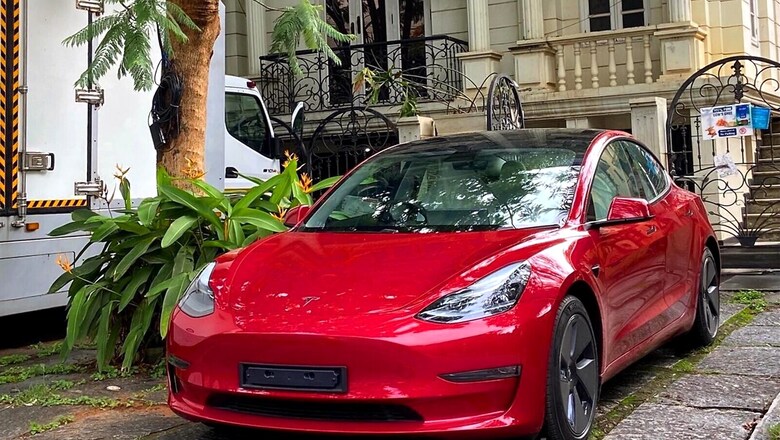
views
While India still awaits for Tesla’s entry, nuggets of hints in the direction are the only solace now. Recently, it was reported that Tesla added Hindi language to its UI, suggesting its plans to enter the Indian market soon. While there has been no word from the Central Government so far, the request is likely to face resistance.
On the other hand, several states in India have rolled out impressive incentives for the purchase of electric cars to foster the option among Indians. Let’s first decode what is FAME and what benefits you get under the policy. FAME is a policy by the Department of Heavy Industries and is an acronym for Faster Adoption and Manufacturing of Hybrid and Electric vehicles. Initially, it was FAME and then in 2019 it was updated as FAME-II. These incentives are over and above the state incentives and are applicable throughout India-
– For two-wheelers: Rs 15,000 per kWh of battery capacity (Maximum up to 40 per cent of the vehicle cost)
– For four-wheelers: Rs 10,000 per kWh of battery capacity (Maximum up to Rs 1.5 lakh)
Further, there are schemes by the Ministry of Finance to ease the burden of owning an EV. These schemes are not under FAME II.
– All EVs are currently subjected to a lower rate of the Goods and Services Tax (GST) at 5 per cent
– First-time buyers can take a loan and get tax benefits of up to Rs 1.5 lakh under Section 80EEB of the Income Tax Act.
Now let’s discuss the incentives by various state governments over and above benefits from the central government –
Delhi
Delhi was among the first few states to announce a comprehensive EV policy. Delhi is also the state with maximum density of EVs per square kilometer.
– For two-wheelers: Rs 5,000 per kWh of battery capacity (Maximum up to Rs 30,000) + scrappage benefiets upto Rs 5,000
– For four-wheelers: Rs 10,000 per kWh of battery capacity (Maximum up to Rs 1.5 lakh)
– For three-wheelers, rickshaws and freight carriers – Benefits upto Rs 30,000
– In addition, the state government has waived off the registration fees and road tax on all types of electric vehicles
Gujarat
Gujarat blew the roof away when they announced their 2021 EV policy, making is the state offering higher per-kWh subsidy for EVs.
– For two-wheelers: Rs 10,000 per kWh of battery capacity (Maximum up to Rs 20,000)
– For four-wheelers: Rs 10,000 per kWh of battery capacity (Maximum up to Rs 1.5 lakh)
– For three-wheelers and rickshaws – Rs 50,000
– Additionally, registration and road tax exemption on all vehicles.
Maharashtra
Maharashtra, very recently, revised its EV policy and now offers some hefty benefits for owning an EV, especially some early bird discounts to limited buyers. Maharashtra is also offering a direct subsidy of Rs 1.5 Lakh on the first 10,000 electric cars to be registered under this policy until 2023.
– For two-wheelers: Rs 10,000 per KwH + Rs 15,000 early bird incentive + Rs 7,000 scrappage + Rs 12,000 other incentives
– For four-wheelers: Rs 1.50 lakh total discount + Rs 25,000 scrappage + Rs 1.5 lakh early bird incentive
– For three-wheelers and rickshaws – Upt Rs 30,000
– Registration and road tax exemption on all electric vehicles.
Rajasthan
Rajasthan is the latest state to announce its EV policy, which is bit different from other states. Under the EV policy, no direct benefit will be given to the buyer on purchase, but a benefit against State Goods and Sevice Tax will be provided (SGST). As per the state government’s Transport Department, government will reimburse SGST (State Goods and Service Tax) amount on purchase on an EV. A lump sum grant amount will be payable on all electric two- and three-wheelers, as per their battery capacity and this grant amount is payable on vehicles purchased from April 1, 2021 to March 31, 2022 and registered till March 2022.
– For two-wheelers – Rs 5,000 for battery capacity upto Rs 2 kWH and upto Rs 10,000 for battery capacity more than 5 Kwh
– For three wheeler – Rs 10,000 for battery capacity less than 3 kwH and upto Rs 20,000 with more than 5 kWH battery capacity.
Meghalaya
Meghalaya also announced its EV policy in 2021 and has set a quota for number of vehicles applicable under the scheme. Also, Meghalaya is the only state to expedite the RTO paperwork of EVs.
– For two-wheelers: Rs 10,000 per kWh of battery capacity
– For cars: Rs 4,000 per kWh of battery capacity
– Additionally, registration and road tax exemption for all EVs.
Karnataka
Karnataka is offering no direct subsidy to EV owners but is offering full exemption from road tax and registration fees for electric vehicles.
Read all the Latest News, Breaking News and Coronavirus News here.

















Comments
0 comment